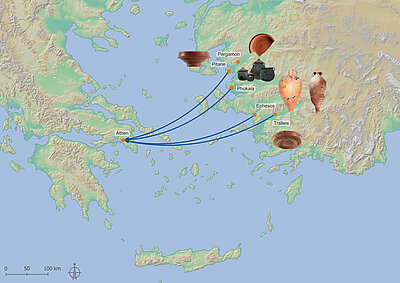![[Translate to English:] [Translate to English:]](/fileadmin/_processed_/2/3/csm_adriaraum_1_8fb1ccab49.jpg)
The »Object Itineraries« Research Group (lat. itinerarium = itinerary) is dedicated to the relationship between people and objects in antiquity. The focus is on researching the mobility of objects and groups of objects in geographical, chronological and cultural terms.
The paths or itineraries of objects provide a unique perspective for understanding the connections between ancient individuals and societies, shedding light on various aspects of ancient life such as culinary practices and social identities. By tracing the itineraries of objects from their creation to their use, distribution, reuse and disposal, we uncover complex networks of trade, exchange, and cultural interaction that shaped the ancient world, allowing us to understand the dynamics of human interaction.
Our research methods are interdisciplinary and include contextual and typo-chronological material culture studies, as well as close collaboration with disciplines such as e. g. Archaeological Sciences. Our aim is to reveal the narratives »stored« within the objects and gain insights into the diverse paths in human interactions with objects. This understanding not only contributes to a better understanding of the past but also to broader discussions on economy, politics, globalization, identity, and cultural heritage as well as on waste management, recycling and other cutting-edge topics.
![[Translate to English:] [Translate to English:]](/fileadmin/_processed_/a/a/csm_Bulgarien_1_Hinterland_Nicopolis_81e437d0cf.jpg)

![[Translate to English:] [Translate to English:]](/fileadmin/_processed_/3/d/csm_byzantinischer_schmuck_1_973792b760.jpg)
![[Translate to English:] [Translate to English:]](/fileadmin/_processed_/5/f/csm_Eastern_Sigillata_2_22e6b56bb6.jpg)
![[Translate to English:] [Translate to English:]](/fileadmin/_processed_/6/a/csm_Ephesos_Buntmetallverarbeitung_1_5e6c89c0bf.jpg)
![[Translate to English:] [Translate to English:]](/fileadmin/_processed_/1/e/csm_Ephesos_Glasanalysen_3_915ba2ddab.jpg)
![[Translate to English:] [Translate to English:]](/fileadmin/_processed_/4/b/csm_Ephesos_Feinware_1_fe419c1bdc.jpg)
![[Translate to English:] [Translate to English:]](/fileadmin/_processed_/f/0/csm_Ephesos_MatKult_03_3ed3763187.jpg)
![[Translate to English:] [Translate to English:]](/fileadmin/_processed_/0/d/csm_amphorenforschung_1_6c26e33dab.jpg)
![[Translate to English:] [Translate to English:]](/fileadmin/_processed_/6/b/csm_Bes_Bild_2_e46240086b.jpg)
![[Translate to English:] [Translate to English:]](/fileadmin/_processed_/e/2/csm_Ephesos_Marmore_1_1ce9bc255d.jpg)
![[Translate to English:] [Translate to English:]](/fileadmin/_processed_/c/9/csm_Syenemuell_1_a62b98e2fd.jpg)